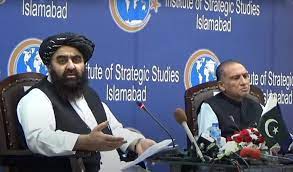75 percent girls in Afghanistan back to schools, confirms Acting FM

Islamabad: Acting Foreign Minister of Afghanistan Amir Khan Muttaqi on Friday confirmed that 75 percent of the girls in the country, after a hiatus following the takeover of Kabul, had returned to schools.
He was responding to a question regarding the situation of education rights of girls in Afghanistan, at his public talk organized by the Centre for Afghanistan, Middle East and Africa (CAMEA) here at the Institute of Strategic Studies, Islamabad (ISSI).
The Taliban after taking control of the country in August had closed the schools with millions of girl students confined to their homes, which had attracted criticism by the international community.
However, the Acting Afghan FM stated that 75 percent of girls had resumed their education after returning to schools.
He pointed out that it was “contradictory” of the international community to emphasize women’s education, but have little focus on the salary of teachers, as the disbursement was getting difficult due to the freezing of the country’s assets.
He mentioned the negative campaign in foreign media against the interim government of Afghanistan, terming it contrary to the facts.
In this regard, he mentioned that the 500,000 civil servants were now being paid and not a single person was fired on the basis of political views. Also, no woman was removed from her job or salary cut.
He said Afghanistan had around 3,000 clinics and hospitals, which were still operational.
Muttaqi said there was no rationale behind the sanctions imposed by the “international human rights champions” on Afghanistan by freezing the assets.
He said the reforms, which the international community wanted the interim government to work towards, could be done “peacefully, and not through pressure tactics”.
He said the current cabinet with all ethnicities already fulfilled the requirement of the international community for an inclusive government.
“We are being punished for something which is a possibility in the future,” he said.
Muttaqi said his government wanted Afghanistan to be no more a conflict ground for major powers.
Afghanistan, he said, for the first time in 43 years had a central, responsible, and sovereign government which had control on every inch of the territory.
“We, in Afghanistan have a historic opportunity to create a win-win situation for everyone. The new developments have opened new opportunities for stability,” he said.
Muttaqi, who arrived here on Wednesday leading a delegation shed light on the new developments in Afghanistan besides expressing views on the new “balanced” foreign policy and relations with Pakistan.
“We must not be a prisoner of the past. The peace in Afghanistan means peace in Pakistan and vice versa,” he said. “We are now pursuing a balanced policy”.
He said there remained no anti-Pak elements in Afghanistan and the new government was trying its best to not let the territory be used against any other country.
The Afghan acting foreign minister said since the takeover of Kabul without any bloodshed, there was peace due to the support of the people.
He stressed that the “new government of Afghanistan does not pursue a policy of revenge”.
Muttaqi said Afghanistan, owing to its unique geographical location, could serve as a point of connectivity for the entire region.
He mentioned that efforts were afoot to have a dialogue with Central Asian states for resumption of its trade with Pakistan, which he said, would also benefit Afghanistan.
He also expressed a desire to have a bilateral trade with Pakistan.
Muttaqi appreciated Pakistan for hosting Afghan refugees residing in the country for more than 40 years.
Director General ISSI Ambassador Aizaz Ahmad Chaudhry said the situation in Afghanistan was a ground reality with a consensus that the people of Afghanistan want peace.
If there is chaos in Afghanistan, it will lead to terrorism, he said.
Chairman BOG, ISSI Ambassador Khalid Mahmood, and Director CAMEA Amina Khan spoke on the occasion.
The event was attended by members of the diplomatic corps in Islamabad, academics, civil society and diplomats.





